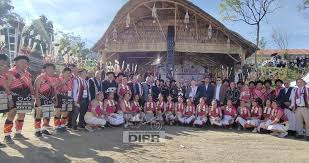Ngada Festival

- 29 Nov 2024
In News:
The Rengma Naga tribe concluded a two-day celebration of the Ngada festival-cum-Mini Hornbill Festival at the Tseminyu RSA ground in Nagaland.
Ngada Festival Overview:
- Celebration: It is an annual celebration observed by the Rengma Naga tribe, marking the end of the agricultural cycle.
- Duration: Typically, an eight-day festival, it is celebrated towards the end of November.
- Significance: It is a festival of thanksgiving, joy, and cultural unity, with a focus on gratitude for the harvest and remembrance of departed souls.
Cultural and Ritual Aspects:
- Rituals: The festival involves rituals for protection from misfortunes, such as fire and evil spirits, as well as prayers for peace and prosperity in the community.
- Agricultural Link: The festival is celebrated after the harvest season, symbolizing the end of the agricultural cycle and the beginning of the storage of crops.
- Official Announcement: The village priest announces the start of the festival, and preparations begin shortly after.
Importance of Ngada:
- Gratitude for the Harvest: The festival is a celebration of the hard work of the agricultural year and the bountiful harvest.
- Cultural Identity: The festival serves as a vital reminder of the Rengma Naga’s cultural heritage and traditions, helping to preserve them for future generations.
- Symbol of Unity: It fosters cultural unity and strengthens community bonds within the tribe.
Tribal Demographics:
- Population: The Rengma Naga tribe has a population of around 62,951 in Nagaland and 22,000 in Assam (according to the 2011 Census of India).
- Ethnic Identity: The Rengmas belong to the Tibeto-Burman ethnic group and identify themselves as Njong or Injang.
Historical and Cultural Background:
- Migration: It is believed that the Rengmas, along with other Naga tribes, migrated from Southeast Asia, crossing the Yunnan Mountain ranges, and eventually settled in the upper Burma region.
- Slavery: Historically, slavery was practiced among the Rengmas, with slaves known as menugetenyu and it sakesa. However, by the time the British arrived, slavery was in decline, and no Rengma tribespeople were known to be slaves.
Economy:
- Agricultural Lifestyle: The Rengma Naga are primarily agriculturalists, relying on Jhum cultivation (shifting cultivation) and wet rice cultivation.
- Crops Grown: They grow staple crops like paddy, along with seasonal crops and fruits.
Religion:
- Traditional Beliefs: Traditionally, the Rengma Naga worship supernatural beings.
- Christianity: Today, most of the Rengma tribe has converted to Christianity.
